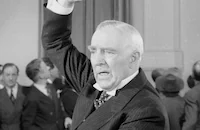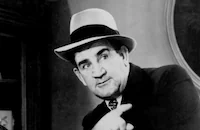True to Life
Brief Synopsis
Cast & Crew
George Marshall
Mary Martin
Franchot Tone
Dick Powell
Victor Moore
Mabel Paige
Film Details
Technical Specs

Synopsis
Highly paid New York radio writers Link Ferris and Fletcher Marvin are about to lose their jobs because the popularity of their melodrama "Kitty Farmer" has declined. Mr. Huggins, president of Sudsy Suds, the company that sponsors the show, insists that they need to make "Kitty" more human. Desperate for inspiration, Link takes to the streets to meet "real" women. After approaching several strangers, Link is thrown off the subway in Sunnyside, and takes shelter from the pouring rain under a diner's overhang. Link is drawn inside by waitress Bonnie Porter's singing, and, believing that he is destitute, Bonnie gives him a free meal. When Bonnie spouts her cheerful philosophy on life and gives Link a brief outline of her family, he realizes that she is the embodiment of "Kitty." Although Link tries to assure her that he is well-situated, Bonnie continues to believe that he is homeless and jobless, and takes him home as a boarder. There, Link meets her charmingly idiosyncratic family: her father, who works at the bakery by day, and is a bumbling inventor at home; her younger brother Clem, who enthusiastically dreams of being a doctor; her younger sister Twips, who immediately becomes infatuated with Link; her cantankerous uncle Jake; and her strong-willed mother, who is suspicious of the apparently shiftless Link. Now a resident with the Porter family, whom he entertains by singing and playing the piano, Link pretends to look for work during the day, but is actually reporting to Fletcher, who writes the script for the new show based on the information Link gives him. During the show's first airing, Link goes to exaggerated efforts to prevent the Porters from listening to it, fearing they will recognize themselves in the characters. Fletcher suspects that Link is falling in love with Bonnie, and decides to spice up the radio show by introducing himself as a new character. One evening, he appears at the Porter home in a tuxedo and top hat, claiming to need the phone for an emergency call. No one is more astonished than Link, who that day rejected Mom Porter's suggestion that he take a job at the bakery. Fletcher's appearance only reinforces Mom Porter's idea that Link should work at the bakery, and the next morning, he rises at five o'clock and starts hauling huge sacks of flour. After Fletcher sends Bonnie several hundred flowers, Link tries to call off the ruse for fear of hurting the Porters. Fletcher is inspired to pay the bakery enough money to give Pop Porter a raise for two years, and Link agrees to stay on at the Porters' for another two weeks. Fletcher takes Bonnie out on a date, and not long after, she is surprised to hear the exact words she spoke on her date on the air during the Kitty Farmer show. That night, Bonnie takes Link on a mysterious date, unwittingly leading him to his own apartment, where she hopes to influence Fletcher to get Link a job singing on the radio. Link and Fletcher, now romantic rivals, are clearly hostile to each other, but Link wins Bonnie over with a love song. Later that night, they confess their love, but their happiness is spoiled when they get home, and Jake introduces them to his lawyer, Mammal. Jake announces that he has learned of Link and Fletcher's ruse, and plans to sue Sudsy Suds in a $100,000 libel suit. Although Link tries to assure the family that he had no intention of hurting them, the Porters feel humiliated and insist that he leave. Huggins refrains from firing the writers after Fletcher proposes that they go on the air and reveal that the "Farmers" are based on a "true-to-life" family. Link agrees to the idea only because it will help the Porters win their case. After the broadcast, the Porters are besieged by reporters, and their home becomes a tourist attraction. However, Bonnie becomes disgusted by the way her family is capitalizing on their sudden popularity and moves out, accusing the family of turning their home into a freak show. Pop Porter realizes that rather than being hurt by the radio show, their family has benefited, and he fires Mammal, who was planning to increase the damages to $1,000,000. Realizing that Bonnie is in love with either Link or Fletcher, Pop Porter arranges for the three to meet at the house one evening. Unknown to them, the dining room where they meet is wired with a microphone, and their conversation is broadcast as the final episode of the Farmer Family radio show. After bickering for several minutes, Bonnie and Link finally reconcile, and Fletcher rejoices over his narrow escape from marriage.

Director

George Marshall
Cast

Mary Martin

Franchot Tone

Dick Powell

Victor Moore
Mabel Paige

William Demarest

Clarence Kolb
Beverly Hudson
Raymond Roe

Ernest Truex
Harry Shannon
Charles Moore
Tim Ryan
Ken Carpenter

Nestor Paiva
Betty Farrington
Charles Cane
Fred A. Kelsey
Stanley Andrews
John Hiestand
Harry Tyler
Harry Hayden

Ann Doran
Madora Keene
Shirley Mills
Billy Bletcher
Bud Jamison
Robert Winkler
Jack Gardner
Jack Baxley
Frank Coleman
Don Kerr
Dan Borzage
Matt Mchugh
Walter Soderling
Constance Purdy
Edward S. Chandler
Edna Bennett

Tom Kennedy
Judy Ford
Paul Newlan

J. Farrell Macdonald
Grace Hayle
Esther Howard
Vernon Dent
Fred Santley
Ethel Clayton
Gloria Williams
Christopher King
Maxine Ardell

Yvonne Decarlo
Alice Kirby
Marcella Phillips
Marjorie Deane
Dorothy Granger
Crew
Ben Barzman
Sol Barzman
Arthur Black
Hoagy Carmichael
B. G. Desylva
Hans Dreier
Don Hartman
Earl Hedrick
Paul Jones
Charles Lang Jr.
Johnny Mercer
Gene Merritt
Walter Oberst
Arthur Phillips
George Sawley
Leroy Stone
Bess Taffel
Harry Tugend
Wally Westmore
Victor Young

Film Details
Technical Specs

Quotes
Trivia
Notes
According to Hollywood Reporter news items, Dalton Trumbo was slated to write this film's screenplay, and Fred MacMurray, Bing Crosby and Bob Hope were considered for lead roles. Trumbo's contribution to the completed film has not been confirmed. In addition, a Hollywood Reporter news item noted that some scenes were shot at the Arthur Murray Dance Studio on Wilshire Boulevard in Los Angeles, CA.












